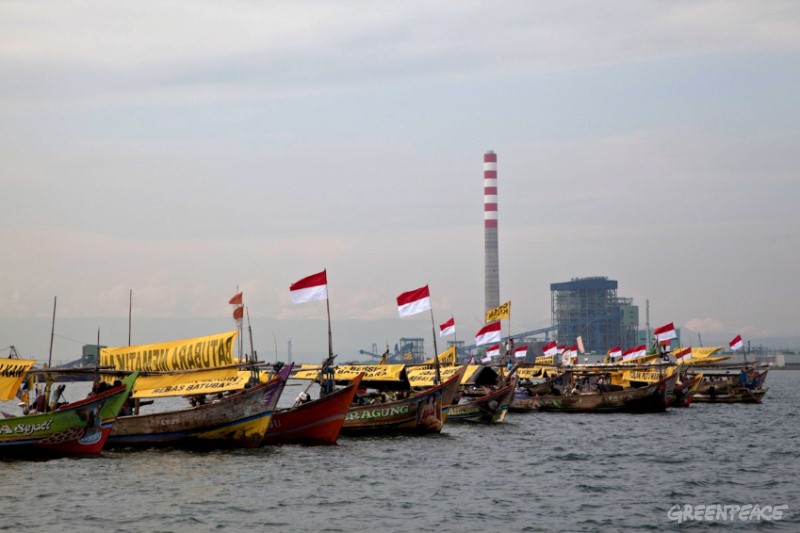
On the occasion, fishermen from Waruduwur village and Greenpeace activists covered in black “coal” powder, displayed a banner with the words “coal kills” in a fishing boat in front of the Cirebon coal fired power plant.
Air pollution from coal combustion is destroying livelihoods, reducing crop yields, adversely impacting fishing catch and slowly killing people. Coal is a curse for communities living around coal mines and in the shadow of coal fired power plants. Burning coal also accelerates climate change which will impact the whole country. Indonesia is amongst the world’s most vulnerable and least prepared to deal with climate change
The report contains testimonials about how coal mines and power plants drastically affect the health and livelihoods of people living near them. The stories expose the grim consequences of coal expansion – toxic pollution, destroyed livelihoods, displaced communities, health effects on the respiratory and nervous systems, acid rain, smog pollution, and reduced agricultural yields – that governments and industries ignore in the quest for “cheap” electricity.
Coal may seem like the most practical fuel because of its abundance. But, from mining, through combustion to waste disposal, and in some cases, recultivation, coal has a dire impact on the environment, human health and the social fabric of communities living near mines, plants and waste sites. Aside from massive CO2 emissions when this fuel is burnt, coal severely damages ecosystems and contaminates water supplies. It emits other greenhouse gases like methane, sulphur dioxide and nitrogen oxide, as well as chemicals such as arsenic and mercury which can disrupt human mental and physical development.
Indonesia is the world’s fifth biggest coal producer and its second largest exporter. Stark evidence of the serious consequences of coal use are clearly seen in some of the country’s coal provinces. Coal mining has caused severe damage to the traditional way of life and the capital city of Kalimantan, Samarinda, with coal concessions occupying 70% of its land area. Coal mines are situated right beside villages, and coal waste from abandoned mines dot the city with toxic lakes. In Cirebon and Cilacap, coal-fired power plants have left communities without livelihoods, and ongoing coal plant operations continue to endanger their health.
At present, Indonesia’s plans to increase electricity generation from coal to about 34.4% by 2025. Plans are underway to reduce oil use and shift to coal and gas, with a target of 10,000 MW from coal. But although the initial program was supposed to be achieved in 2009 with the completion of 35 coal powered plants — ten on the island of Java, and the rest in other parts of the country – less than 60% of the target has been completed.
It’s not too late. Indonesia doesn’t need more coal, it needs an energy revolution.
Renewable energy combined with energy efficiency can cut CO2 emissions as per President Yudhoyono’s commitment to reduce Indonesia’s greenhouse gas emissions. Indonesia has abundant solar, wind and geo-thermal power to meets its energy requirements. If the Indonesian government abandons its dirty energy plans, it can meet over 40 percent of primary energy demand through these renewable sources. This will not only halt further human and societal damage, as well as ecological degradation and devastating climate change impacts. It will also be an important contribution for the future of our children and grand-children’s future.
